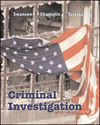 |  Criminal Investigation, 8/e Charles R. Swanson,
University of Georgia
Neil C. Chamelin,
Assistant State Attorney, Second Judicial Circuit
Leonard Territo,
University of South Florida- Tampa
Field Notes and Investigative Reporting
Chapter Overview Field notes play a significant role in every criminal investigation. They provide a short written record of events, times, places, suspects, witnesses, and other information and are used as the basis of incident/offense reports. The importance of taking effective and complete notes in every investigation, regardless of the offense, should not be underestimated. Because field notes are more reliable than a person’s memory, they can be used as a source of specific facts and details that otherwise might be forgotten. Detailed field notes also reduce the need to recontact victims and witnesses regarding information that was overlooked or questions that were not asked in the initial contact. Finally, it is not uncommon for officers to testify in court several months or years later regarding a particular investigation. Comprehensive field notes not only can help refresh the investigator’s memory but also can strengthen his or her court testimony. This chapter examines several aspects of the field note and report writing process. After discussing field notes and the basic and primary questions that need to be asked in an investigation, it addresses the importance of completing well-prepared incident/offense reports. Incident report formats vary among law enforcement agencies. Despite the variation however, there are common elements that should be included in all reports. Investigators should gain as much information as possible when arriving at the crime scene. Even facts and details that seem unnecessary at first may later proves to be highly valuable to the investigator. |
|



 2002 McGraw-Hill Higher Education
2002 McGraw-Hill Higher Education